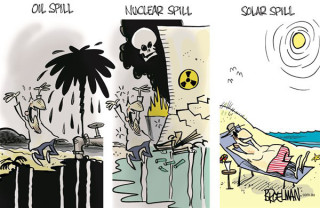my drinking water might be radioactive
2023-Mar-27, Monday 09:19 amI mentioned before that I keep potassium iodide pills in stock as a protection against radiation exposure. The problem, though, is that I might not know when is the appropriate time to take them.
The nearby Monticello nuclear plant leaked 400,000 gallons of radioactive tritium back in November, but they didn't bother telling the public until March 16. They assured us that everything was fine only when they finally informed us months later... until suddenly it wasn't fine. Another mere hundreds of gallons has leaked again. This time, they admit the possibility of it reaching groundwater then moving from there to the Mississippi River where cities get their drinking water. Sure, a few hundred gallons now are potentially dangerous, but 400,000 gallons previously are just fine. How? I need diagrams and pictures with this explanation, please. On the plus side, the kind of radiation here (weak beta) is relatively easy to block and wouldn't respond to potassium iodide treatment anyway, unlike the kind when uranium is involved. The NRC has more detail on tritium dangers.
Minneapolis says it is "developing plans to safeguard" our drinking water. Just now?! Developing plans... when we live literally 80km/50mi downstream from nuclear plants? Why do I always find government bureaucracy so incompetent? Does nobody else but me see systemic risks and try to plan for them ahead of time?
 Once again, I find an urgent need to discuss "capitalism", as it exists now in its current state. People keep trying to promote nuclear fission as a green form of energy. It isn't. They keep telling us how safe it is now, but it's safe only when there are no accidents. (Hint: There are always accidents.) Moreover, uranium is in limited supply on planet Earth. I suspect somebody just wants uranium to be the new oil, with a few resource owners doling out a limited supply for a desperate energy-hungry world. I've mentioned before just how limited is our supply of uranium. Don't fall for these misdirections. Maybe thorium fission reactors are different. Absolutely, hydrogen fusion reactors (which coincidentally will need tritium) are safer and greener, with potential fuel supplies lasting far into our future. Wind energy is safe. Geothermal energy is safe. Solar electric energy will be truly safe only after we stop using dangerous chemicals to produce solar panels.
Once again, I find an urgent need to discuss "capitalism", as it exists now in its current state. People keep trying to promote nuclear fission as a green form of energy. It isn't. They keep telling us how safe it is now, but it's safe only when there are no accidents. (Hint: There are always accidents.) Moreover, uranium is in limited supply on planet Earth. I suspect somebody just wants uranium to be the new oil, with a few resource owners doling out a limited supply for a desperate energy-hungry world. I've mentioned before just how limited is our supply of uranium. Don't fall for these misdirections. Maybe thorium fission reactors are different. Absolutely, hydrogen fusion reactors (which coincidentally will need tritium) are safer and greener, with potential fuel supplies lasting far into our future. Wind energy is safe. Geothermal energy is safe. Solar electric energy will be truly safe only after we stop using dangerous chemicals to produce solar panels.
For now, I'm annoyed that I don't know if my drinking water is safe. The contemptible interplay of capitalist interests with government oversight is just... dangerous.
no subject
Date: 2023-Mar-27, Monday 05:15 pm (UTC)no subject
Date: 2023-Mar-27, Monday 05:37 pm (UTC)Radon gas seeping upward in every house is much more dangerous than whatever tritium would arrive at Minneapolis. I worry, though, that nobody here monitors for issues that corporate operations might not tell anyone about, just like lead in the air here from Northern Metals Recycling. At least, no warning until it's too late to matter.
no subject
Date: 2023-Mar-27, Monday 09:55 pm (UTC)That article about iodine seemed very confused. Iodine is chemically volatile, and easily absorbed and concentrated by the thyroid (and other glands). Iodine isotopes are plentiful in uranium fission products, with short half-lives so their radiation intensity is high but brief. A potassium iodide pill or two can block absorption of iodine until most of it has decayed. The distinctive frequencies of gamma rays also make it easy to track radioactive iodine, so we know if a core meltdown or bomb fallout happens.
Still, coal is worse than nuclear. I think the natural radioactivity released by coal plants into the air each year (in tiny traces, but coal is measured in tons) is still greater than a century of nuclear tests and leaks put together (which mostly don't leak into the air).
no subject
Date: 2023-Mar-28, Tuesday 04:48 pm (UTC)no subject
Date: 2023-Mar-28, Tuesday 01:14 am (UTC)https://bigthink.com/hard-science/extract-uranium-seawater/
Still, I think nuclear power will disappear once the current plants reach the end of their service lives. The cost per MWh of renewable energy is ridiculously low. More importantly to utilities, renewables can be installed quickly, with little capital expenditure, in the amounts you need. Nuclear has huge up-front costs, and takes decades to come on line.
https://en.wikipedia.org/wiki/Cost_of_electricity_by_source
no subject
Date: 2023-Mar-28, Tuesday 01:16 am (UTC)no subject
Date: 2023-Mar-28, Tuesday 04:41 pm (UTC)